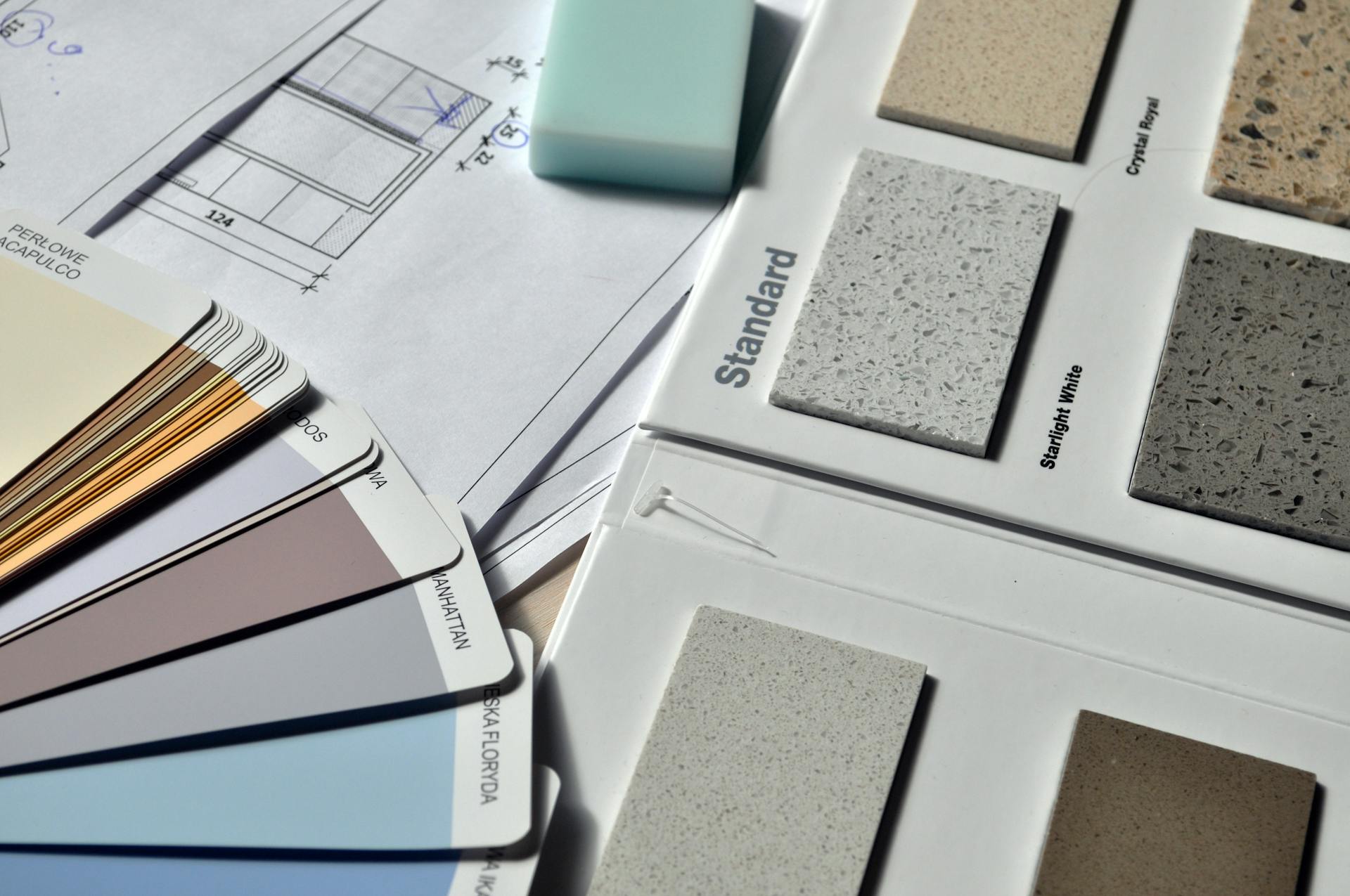How to Choose the Perfect Color Palette for Your Home
The Power of Color in Interior Design
Color transforms spaces more dramatically than any other design element. When searching for “interior designers near me” in Kolkata, homeowners consistently ask: “How do I choose colors that will make my space feel larger, more comfortable, and uniquely mine?” At The Mark Decor, we’ve perfected color selection strategies across thousands of interior design in Kolkata projects, from intimate small bedroom interior design to expansive office interior design in Kolkata environments.
Whether you’re working with a home interior designer to refresh your living space or planning flat interior design for your new apartment, understanding color psychology, coordination principles, and Kolkata’s unique lighting conditions will empower you to create spaces that truly reflect your personality while enhancing daily life.

Understanding Color Psychology in Interior Design
Colors have a profound psychological impact on our mood, productivity, and overall well-being. When working on living room interior design or luxury bedroom interior design, understanding these effects helps create spaces that serve their intended purpose effectively.
Warm Colors (Reds, Oranges, Yellows):
- Create energy and warmth
- Perfect for social spaces like dining rooms
- Ideal for creative small office interior design to boost creativity
- Can make large rooms feel more intimate
Cool Colors (Blues, Greens, Purples):
Promote relaxation and calm
Excellent for bedrooms and bathrooms
Suitable for small office interior design to enhance focus
Make small spaces appear larger
Neutral Colors (Whites, Grays, Beiges):
Provide versatility and timelessness
Form the foundation of modern home interior design
Allow for easy seasonal updates
Perfect for duplex house interior design continuity
Step-by-Step Guide to Choosing your Color Palette
Colors have a profound psychological impact on our mood, productivity, and overall well-being. When working on living room interior design or luxury bedroom interior design, understanding these effects helps create spaces that serve their intended purpose effectively.
1. Start with Inspiration
Begin by gathering inspiration from various sources:
Nature photographs
Artwork you love
Fabric patterns
Travel memories
Pinterest boards and design magazines
2. Consider Your Home's Architecture
Your home's architectural style should influence your color choices:
Traditional Homes: Rich, deep colors like burgundy, forest green, and navy blue work beautifully with classic moldings and fixtures.
Modern Homes: Clean, crisp colors such as whites, grays, and bold accent colors complement contemporary lines.
Colonial Style: Warm, earthy tones like terracotta, sage green, and cream enhance the historical charm.
3. Evaluate Natural Light
Natural light significantly affects how colors appear throughout the day:
North-facing rooms receive cooler light, so warm colors help balance the space
South-facing rooms get abundant warm light, making cool colors appear more vibrant
East-facing rooms receive morning light, perfect for energizing warm colors
West-facing rooms get afternoon light, ideal for cooler tones to balance intense sun
4. Apply the 60-30-10 Rule
This fundamental interior design in Kolkata principle ensures balanced color distribution:
60% - Dominant color (walls, large furniture pieces)
30% - Secondary color (upholstery, curtains, rugs)
10% - Accent color (pillows, artwork, accessories)
Advanced Color Techniques
Creating Flow Throughout Your Home
- For duplex house interior design or homes with open floor plans, maintaining color continuity is essential:
Use a consistent neutral base throughout common areas
Vary color intensity rather than changing colors completely
Repeat accent colors in different rooms to create visual connection
Consider sightlines when choosing colors for adjacent spaces
Working with AI Interior Design Tools
- Modern ai interior design tools can help visualize color combinations before committing. These technologies allow you to:
Test multiple color schemes quickly
See how natural light affects your choices
Experiment with different furniture arrangements
Share ideas with family members or designers
Room-Specific Color Palette Strategies
Living Room Interior Design
The living room serves as your home’s social hub, requiring a welcoming yet sophisticated palette:
- Classic Approach: Neutral base with warm accent colors
Walls: Soft gray or cream
Furniture: Navy or charcoal
Accents: Warm brass, coral, or sage green
- Bold Modern Approach: Dramatic contrasts
Walls: Deep navy or charcoal
Furniture: White or light gray
Accents: Bright yellow or emerald green
Luxury Bedroom Interior Design
- Bedrooms should promote rest and relaxation while reflecting personal style:
Serene Sanctuary: Cool, calming tones
Walls: Soft blue or lavender
Bedding: White and cream layers
Accents: Silver or gold metallics
- Dramatic Elegance: Rich, sophisticated colors
Walls: Deep jewel tones like emerald or sapphire
Bedding: Neutral linens in cream or gray
Accents: Brass fixtures and warm wood tones
Kids Room Interior Design
Children’s spaces require colors that stimulate creativity while being age-appropriate:
- Playful Yet Timeless:
Walls: Soft, muted versions of bright colors
Furniture: White or natural wood
Accents: Bright, changeable elements through bedding and artwork
Small Office Interior Design
Office spaces need colors that enhance productivity and focus:
- Professional Focus:
Walls: Soft blue or green for concentration
Furniture: White or light wood
Accents: Energizing yellow or orange in small doses
Common Color Palette Mistakes to Avoid
Choosing colors in isolation - Always consider how colors work together
Ignoring undertones - Every color has warm or cool undertones that affect compatibility
Following trends blindly - Choose colors you genuinely love
Forgetting about existing elements - Consider flooring, built-ins, and permanent fixtures
Not testing colors - Always test paint colors in different lighting conditions
With The Mark Decor whether you’re designing a sophisticated clubhouse interior design or creating stunning model flats interior design, the right color palette is fundamental to success.

Maintaining Your Color Palette Over Time
- A well-chosen color palette should evolve gracefully:
Update accents seasonally while keeping the base colors
Add new textures in your established color scheme
Incorporate metallics to add sophistication
Use plants and natural elements to bring life to any palette
Testing Your Color Palette
Before finalizing your choices:
Paint large swatches on different walls to see how light affects them
Live with test colors for at least a week
View colors at different times of day
Consider how colors look with your existing furnishings
Get opinions from family members who use the space
The Investment in Professional Design
Working with experienced office interior design Kolkata professionals or residential interior specialists ensures:
Access to exclusive color resources
Understanding of current trends and timeless choices
Proper color coordination across all elements
Avoidance of costly mistakes
Faster decision-making process
Frequently Asked Questions (FAQs).
What is the best color palette for small homes?
Light, neutral colors work best for small spaces as they reflect light and create an illusion of spaciousness. Whites, soft grays, and pale pastels are excellent choices. Use darker colors sparingly as accents to add depth without overwhelming the space.
How many colors should be in a home's color palette?
A successful home color palette typically includes 3-5 colors: one dominant neutral, one or two supporting colors, and one or two accent colors. This creates visual interest while maintaining harmony throughout your space.
Should every room have the same color palette?
While rooms don’t need identical color palettes, they should have some connecting elements for flow and continuity. Use variations of your main palette or repeat certain colors in different intensities across rooms.
How do I choose colors for a room with little natural light?
For rooms with limited natural light, choose warm colors to add energy and brightness. Avoid dark colors that can make the space feel cramped. Consider adding mirrors and artificial lighting to enhance the effect of your chosen palette.
What's the difference between warm and cool colors in interior design?
Warm colors (reds, oranges, yellows) create energy and intimacy, making rooms feel cozy and inviting. Cool colors (blues, greens, purples) promote calm and relaxation, making spaces feel more spacious and serene.
Choosing the perfect color palette for your home requires careful consideration of multiple factors including natural light, architectural style, room function, and personal preferences. From intimate residential interior projects to expansive commercial interior design spaces, understanding color theory and its practical application is essential for creating environments that are both aesthetically pleasing and functionally effective.
At The Mark Decor, we’re committed to helping homeowners and businesses throughout Kolkata and beyond create exceptional interiors that stand the test of time. Our expertise spans from cozy residential interior renovations to sophisticated clubhouse interior design projects, always with an emphasis on thoughtful color selection and harmonious design.
 WhatsApp
WhatsApp